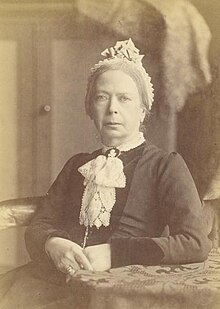Frances Buss

Frances Mary Buss (16 August 1827 – 24 December 1894) was a headmistress and an English pioneer of women's education.[1]
The daughter of Robert William Buss, a painter and etcher, and his wife, Frances Fleetwood, Buss was one of six of their ten children to survive into adulthood. Her grandparents, whom she was visiting in Aldersgate, sent her to a private school housed in the most basic accommodation "...to get me out of the way".[2] Next she was sent to a similar school in Kentish Town which she remembered as simply consisting of children learning Murray's Grammar. Aged 10 she attended a more advanced school in Hampstead; by the age of fourteen she herself was teaching there and by sixteen she was occasionally left in charge of the school.[3]
Her father's career as an artist being at times unsuccessful, to help the family finances her mother set up a private school in Clarence Road, Kentish Town, in 1845, at which Frances assisted,[4] and which was based on the ideas of Johann Heinrich Pestalozzi. During 1848–9, she attended evening lectures at the newly opened Queen's College in Harley Street, London. She was taught by F. D. Maurice, Charles Kingsley, and R. C. Trench, and gained certificates in French, German and Geography. To Dorothea Beale, a contemporary at Queen's, she described the education she had gained there as opening ‘a new life to me, I mean intellectually’.[5]
The Buss's school was renamed the North London Collegiate School and moved to larger premises in Camden Street on 4 April, 1850. Buss was its first Principal and remained so for the rest of her life. Under her headship, the school became a model for girls' education. By 1865 the school had 200 day girls, with a few boarders, but was still run as a private, family concern, with her father Robert William Buss and her brother Septimus Buss teaching Art and Scripture respectively. In July 1870 Frances Buss handed over the school to trustees, and in the following year she founded the Camden School for Girls with the aim of offering more affordable education for girls. She was the first ever headmistress.[6]
Buss was at the forefront of campaigns for the endowment of girls' schools, and for girls to be allowed to sit public examinations and to enter universities. She became the founding president of the Association of Head Mistresses in 1874, a position she held until 1894,[7] and was also involved in establishing the Teachers' Guild in 1883 and the Cambridge Training College (later Hughes Hall) for training teachers in 1885.
In 1869 she became the first woman Fellow of the College of Preceptors, helping to establish the College's professorship of the science and art of education in 1872. Her election to a Fellowship of the College in 1873 was the only public recognition she ever received.[8] She was also a member of the Council of the Teachers' Training and Registration Society.
Buss was also a suffragist, participating in the Kensington Society, a woman's discussion society, and the London Suffrage Committee.
Her name is associated with that of Dorothea Beale in a satirical rhyme:
- Miss Buss and Miss Beale,
Cupid's darts do not feel.
How different from us,
Miss Beale and Miss Buss.
Models
The educational values that Frances Buss taught at the North London Collegiate School became the model used by Edith Aitkin, a former pupil, when establishing Pretoria High School for Girls in Pretoria, South Africa in 1902[9].
Notes
- ^ "Britannica Online Encyclopedia". Retrieved 2008-04-07.
- ^ A. E. Ridley, Frances Mary Buss and her work for education (1895) pg 3
- ^ Elizabeth Coutts, ‘Buss, Frances Mary (1827–1894)’, Oxford Dictionary of National Biography, Oxford University Press, Sept 2004
- ^ Kamm, Josephine 'How Different From Us: A Biography of Miss Buss and Miss Beale' London: The Bodley Head (1958)
- ^ Buss to Beale, 13 Jan 1889, North London Collegiate School archives
- ^ 'The North London Collegiate School 1850-1950: A Hundred Years of Girls' Education' Published by Oxford University Press (1950)
- ^ Dictionary of British Educationists By Richard Aldrich and Peter Gordon Published by Routledge (1989) ISBN 0713001771
- ^ College of Teachers' Archive
- ^ http://hamiltonschool.pta.myweb.absamail.co.za/hamiltonhistory.htm
